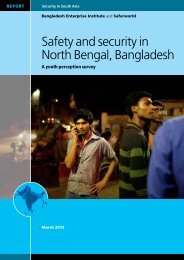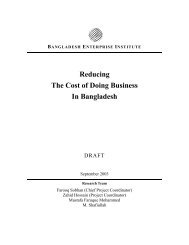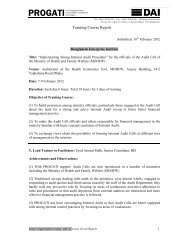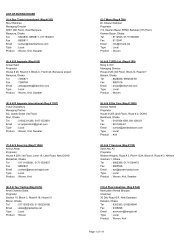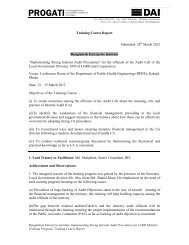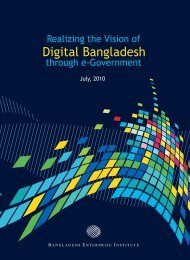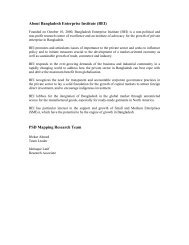Bangladesh Social Enterprise Project - Bangladesh Enterprise Institute
Bangladesh Social Enterprise Project - Bangladesh Enterprise Institute
Bangladesh Social Enterprise Project - Bangladesh Enterprise Institute
You also want an ePaper? Increase the reach of your titles
YUMPU automatically turns print PDFs into web optimized ePapers that Google loves.
easonable rate of return, meaning that they rarely amass sufficient capital to invest in valuecreating<br />
activities. Micro‐credit organisations need to continue to expand their offerings of<br />
micro‐insurance and micro‐savings.<br />
Access to basic skills: Thanks to the micro‐credit movement, our survey and consultations<br />
indicated that access to finance is now less of a problem for many enterprises than access to<br />
basic skills. Often, social or conventional entrepreneurs lack basic skills in accounting,<br />
bookkeeping and business planning, meaning they may lack credibility with lenders or donors.<br />
Lack of English language skills can also be a barrier to entrepreneurs seeking to engage with<br />
donors or multinational companies.<br />
Access to information: <strong>Social</strong> or conventional entrepreneurs, particularly if they are not already<br />
members of the elite, often lack access to social networks which are a crucial sources of<br />
information about business opportunities and sources of funding.<br />
Access to multinationals: The benefits of foreign direct investment will only be fully realised if<br />
<strong>Bangladesh</strong>i entrepreneurs are able to identify opportunities to supply multinational<br />
companies. The information gap between multinationals and local entrepreneurs represents a<br />
barrier to entrepreneurship and inefficiency for the multinationals, which may often be unable<br />
to identify cheap local sources of supply.<br />
Multinational companies may be unaware of the availability of viable suppliers, or they may find it too costly to use them as<br />
sources of inputs. In developing countries, policies may be required to compensate for weak financial markets or weak<br />
institutions like vocational schools, training institutes, technology support centres, R&D and testing laboratories and the like.<br />
Well‐designed government intervention can raise the benefits and reduce the costs of using domestic suppliers.<br />
The role of policy is most significant where there is an “information gap” on the part of both buyers and suppliers about linkage<br />
opportunities, a “capability gap” between the requirements of buyers and the supply capacity of suppliers and where the costs<br />
and risks for setting up linkages or deepening them can be reduced.<br />
UNCTAD World Investment Report 2001<br />
BSEP: Policy Brief<br />
Page 7




